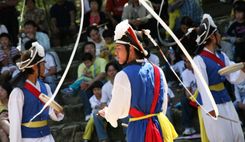Bong Joon-ho
Bong’s films tend to be dark, meaningful, finely crafted pieces. As such, it may come as a surprise to hear that he’s best known for a monster film, The Host (2006), which shattered domestic box-office records on release. Though essentially about a giant lizard which emerges from the Han River and starts chowing down on Seoulites, this is more than a mere “Kollywood” blockbuster – its political subtext is obvious from the beginning, which sees a US Army-sanctioned dumping of formaldehyde into Seoul’s main river.
Top image © bushirasan/Shutterstock





